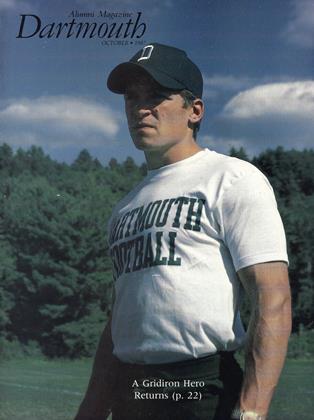An economic litmus test.
If Finance Minister Juan Cariaga's free-market program succeeds in revitalizing Bolivia's economy, he may have Joaquin Aguirre to thank more than anybody else. Aguirre, a 1944 graduate of Dartmouth in comparative literature and philosophy, is building a grain elevator and port facility in eastern Bolivia that a World Bank expert says could double the country's legal exports by significantly reducing transportation costs.
Understanding why Aguirre's venture could have such a dramatic impact requires a brief geography lesson. An important reason why Bolivia has never developed legal alternatives to its traditional reliance on tin is that exporters face daunting transportation hurdles. The landlocked country lost its access to the Pacific Ocean when Chile won the socalled Guano War in 1879-83. To truck goods to Peru and Argentina requires crossing a string of 12,000- foot mountains. The only route to Brazil is an ancient and expensive-torun railway line.
Analyzing the problem several years ago, Aguirre realized that one export possibility existed that nobody had tapped: transporting goods via the Paraguay River, which separates Bolivia from Brazil. Aguirre broke ground on the project, Puerto Quijarro, last year and in August was scheduled to have finished the docking facility. Still to be completed are the grain elevator, a railroad spur connecting the port with the city of Puerto Suarez, and the dredging of a canal linking the port with the Paraguay River.
Though he is stymied by a lack of investment funds (he needs a total of $10 million), the payoff for Bolivia will be $600 million in exports—equal to the amount of all current legal exports, according to World Bank consultant David Morawetz.
This is not the first time that Aguirre, who like Juan Cariaga attended Dartmouth on an Institute of International Education scholarship, has displayed an entrepreneurial flair. In the 1950s he established the first supermarket chain in Colombia, eventually selling out to a larger company for a big profit. In the mid-19605, while living in Ecuador, he invented a process for making dried banana flakes, which are used today in such products as banana-flavored ice cream and Betty Crocker's Chiquita Banana Nut Muffin Mix. As he had done before, he sold the firm he had formed to produce banana flakes for a tidy profit.
"I've spent much of my adult life away from Bolivia working as a businessman," says Agu irre, who has also written two highly acclaimed novels. "Now I've returned to do something for my country. It's not easy being an entrepreneur here- you can be kidnapped, have your land expropriated, get entangled in red tape. But I'll be damned if I'll let anybody stop me from completing Puerto Quijarro." —T.B.
 View Full Issue
View Full Issue
More From This Issue
-
 Feature
FeatureSETTING FREE THE MARKET
October 1987 By Tyler Bridges -
 Feature
FeatureBuilding a Better Student Body
October 1987 By Thurman Zick -
 Cover Story
Cover StoryThe Buddy System
October 1987 By Frank Cicero '85 -
 Feature
FeatureWhat Price Glory?
October 1987 By Ted Leland -
 Feature
FeatureAlumni Gym Scrapbook
October 1987 By Gil Williamson -
 Feature
FeatureBad Things You Learned in Gym
October 1987 By Lee Michaelides







